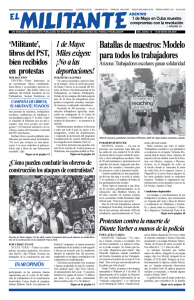PHILADELPHIA — Meek Mill, an internationally known African-American rap artist, was released on bail from the state penitentiary in Chester April 24. Upon hearing the rumor he would be freed, hundreds gathered outside the prison, including nearby neighbors, some holding “Free Meek Mill” signs.
Mill, 30, had been in prison since November 2017, thrown back behind bars on accusations of probation violations related to a conviction when he was 19. In 2008 he was jailed for eight months and then put on probation for five years after Philadelphia cops stopped him on the way to a store, beat him and framed him up on charges of possessing drugs and a weapon.
Mill has been repeatedly arrested and dragged into court by Common Pleas Court Judge Genece Brinkley for alleged probation violations over the last 10 years. In November she sentenced him to another two to four years, against the recommendations of both city prosecutors and Mill’s parole officer and in spite of the fact the charges she based her ruling on were dropped.
Thousands of workers and young people around the country took up the “Free Meek Mill!” campaign, organizing protests, petitions and forums.
The Pennsylvania Supreme Court said they ordered Mill released on bail because the credibility of the 2008 arresting cop has been seriously compromised, and prosecutors now support a new trial. Reginald Graham, the cop who arrested Mill in 2008, was the only witness against him at his trial. Last fall Graham’s name surfaced on a previously concealed list kept by the Philadelphia District Attorney’s Office of some two dozen cops “with a history of lying, racial bias, or brutality.” And another cop who was present when Mill was arrested swore in an affidavit that Graham lied when he said Mill pointed a gun at him.
Mill has won broad support from artists and sports figures. Michael Rubin, an owner of the Philadelphia 76ers NBA team — Mill’s favorite basketball team — and actor Kevin Hart visited him in prison just hours before he was freed. Rubin had visited Mill earlier in April, along with Robert Kraft, owner of the New England Patriots. Players Joel Embiid, Ben Simmons and Markelle Fultz also visited Mill, and sported their “Free Meek Mill” T-shirts in public.
After he was released, Mill joined Rubin, who had a helicopter waiting. They flew to a 76ers playoff game here. The Wells Fargo Arena announcer said, “Welcome home, Meek Mill!” over the loudspeaker. He was cheered by a sold-out crowd as he rang the pregame ceremonial bell wearing a Joel Embiid jersey.
Mill’s release has been a big topic of discussion among workers here. “This is just awesome!” one Walmart worker told the Militant. Kevin Johnson, another Walmart worker, said, “With the release of Meek Mill, I hope that our justice system has to take a new approach on its probation system.”
About one-third of Pennsylvania’s 50,000 prisoners are workers on probation or parole who’ve been sent back to jail. In 2015 there were 183,000 people on probation here. The U.S. has the world’s highest incarceration rate — 22 percent of the world’s prison population, and disproportionately African-American.
“The specifics of Meek’s case inspired me to write this,” Mill supporter and performer Jay-Z wrote in an op-ed in the New York Times last fall. “But it’s time we highlight the random ways people trapped in the criminal justice system are punished every day. The system treats them as a danger to society, consistently monitors and follows them for any minor infraction — with the goal of putting them back in prison.”
After his release, Mill told NBC Nightly News, “I ain’t feel free since I caught this case at the age of 19; I’m 30 now.” He spoke about how he hoped his fight would help others still in prison.
“I got a lot of important people depending on me,” he said. “And I’m not talking about them people, public officials, I’m talking about the men that’s depending on me going through the same thing I’m going through.”

